Read PEOPLE's Cover Story on Gypsy Rose Blanchard's Prison Release After Murdering Mom: 'Ready for Freedom'
In a candid, exclusive interview, the 32-year-old victim of Munchausen syndrome by proxy shares regret about the past — and her hopes for the future
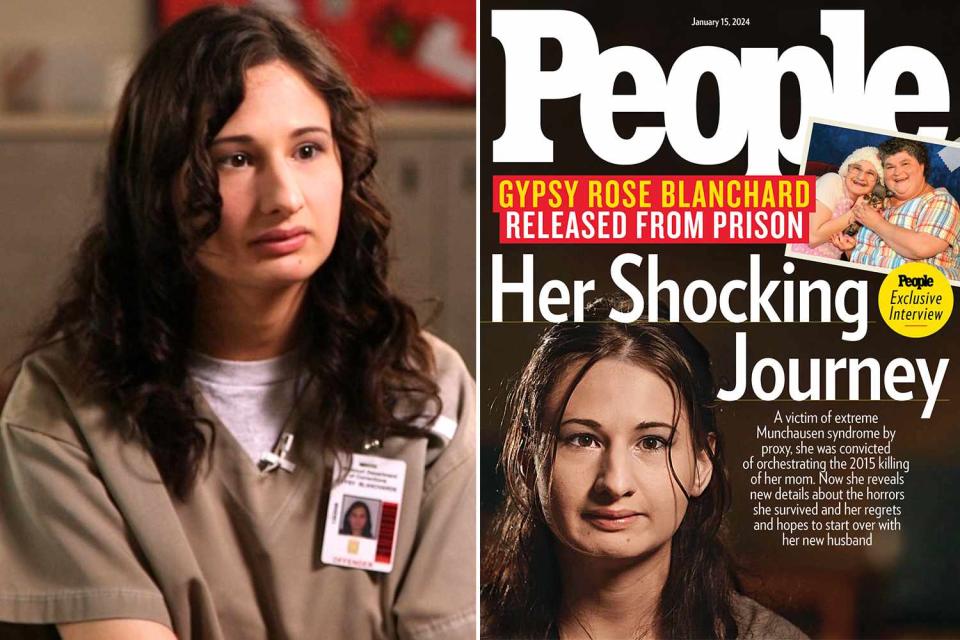
“What’s in a name?” is one of the existential questions that Gypsy Rose Blanchard has had more than eight years to ponder behind bars. When it comes to her own moniker and the inspiration behind it, “I was never told,” she says of the name her mother, Clauddine “Dee Dee” Blanchard, gave her at birth.
Was she indeed named after famed 1930s burlesque dancer Gypsy Rose Lee? She can’t be sure.
“But I did a little digging into Gypsy Lee’s life,” says Blanchard, 32, of the late star. “Her mother was a stage mom and forced her to become famous. I thought that was quite interesting.”
For much of the past decade, modern-day Gypsy has been digging into her and her mother’s stories and has discovered a lot about their dark, twisted — and now infamous — journey. In 2016 she pleaded guilty to second-degree murder for conspiring with her ex-boyfriend Nicholas “Nick” Godejohn to kill her 48-year-old mother, Dee Dee, who was stabbed to death by Godejohn in her Springfield, Mo., home on June 9, 2015, as Gypsy waited in the bathroom.
The murder and ensuing trial captured the world’s attention, largely because lawyers and experts on the case showed Gypsy to be the victim of one of the world’s worst known cases of Munchausen syndrome by proxy, a rare psychological disorder in which a caretaker, often one’s mother, seeks attention and medical help for exaggerated or made-up symptoms of a child in their care. For Gypsy that meant a childhood full of lies about fictitious illnesses and years of painful procedures, which her mother falsely told everyone—from close family members to doctors, from nurses to charities—were medical interventions Gypsy desperately needed.
What was true: “I was desperate to get out of that situation,” claims Gypsy.
Now she believes her mom struggled with untreated mental illness.
“In hindsight I really wish someone could have seen the signs and helped her,” she says. “Helping her would have helped me.”
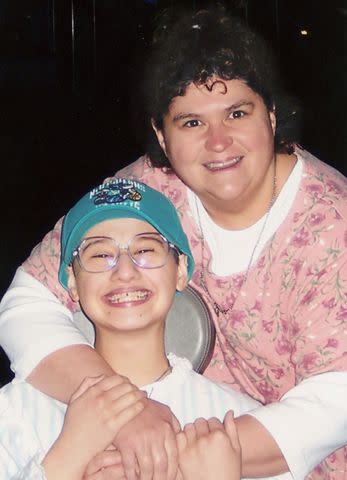
Courtesy Blanchard Family
Dee Dee and Gypsy Rose BlanchardIt’s a story that has had its day in court and in Hollywood, with the HBO film Mommy Dead and Dearest in 2017 and Hulu’s hit series The Act in 2019. But never has Gypsy shared her full journey, including new claims of childhood sexual abuse by a family member and details of what life has been like since the murder.
On Dec. 28, she walked free from the Chillicothe Correctional Center in Missouri, having been granted parole two years shy of her 10-year sentence. As she faces a life of freedom for the very first time, she will be reliving her complicated story in Lifetime’s new docuseries The Prison Confessions of Gypsy Rose Blanchard, premiering Jan. 5. Now newly married, Gypsy shares in an exclusive prison interview days ahead of her release all she’s survived and how she’s learning to forgive both her mom and herself for the unthinkable.
“I’ve been waiting for this for so long,” says Gypsy. “I’m ready for freedom.”
Reflecting on when she first entered Chillicothe prison in 2016, Gypsy recalls the paradox of feeling more free than she ever had up until that point.
“Coming in I was like, ‘This is amazing — I’m able to make friends, make choices for myself,’” she says. “Even though it’s controlled and limited, it was more than what I had before.”
As she describes it, life before was a suffocating, constant, different kind of captivity. Born and raised in southern Louisiana by her single mom, Dee Dee, Gypsy was largely kept from having a relationship with her father, Rod, who split from Dee Dee before Gypsy was born.
“I can go back in my memory as far as maybe 3 years old,” says Gypsy. “I was holding a Barney stuffed animal, and my mom was walking beside me, holding my hand. It’s a simple memory, but it was sweet.”
In those early years Dee Dee had already begun spinning a dangerous web of lies about her daughter’s health. She convinced doctors Gypsy couldn’t walk and made her use a wheelchair by age 7. Later came a litany of other imaginary ailments, like digestive issues requiring feeding tubes and a false cancer diagnosis, for which Dee Dee shaved Gypsy’s hair.
The most painful, says Gypsy, “was the removal of my salivary glands in my neck,” a procedure she underwent around 2007. “They made two incisions, and I didn’t respond well to the anesthesia. Recovery was really hard. To this day it has left me with the side effect of having to clear my throat all the time. And the reason why I had surgery is because my mom put Orajel on my gums to make me drool at the appointment. She complained to the doctor that I drooled too much.”
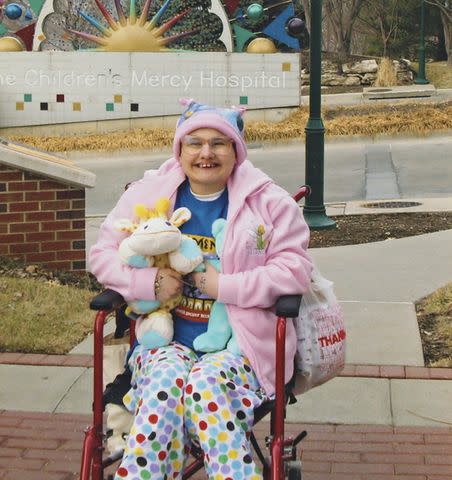
Courtesy Blanchard Family
Gypsy Rose BlanchardGypsy’s family members, many of whom are interviewed in the new docuseries, offer a range of reasons why they, like her doctors, couldn’t see through Dee Dee’s deception.
“We thought Dee Dee may have exaggerated some things,” says dad Rod, “but with major things like being in a wheelchair, it was hard to question, knowing that she was going to doctors.”
For years, Gypsy says, she herself never raised questions.
“Obviously I knew that I could walk and that I didn’t need a feeding tube, but everything else was a really big confusion for me,” says Gypsy, who grew up isolated and only briefly attended school. “I was limited in what I could watch and my exposure to other kids. What I knew of the outside world was only in Disney cartoons, and those don’t talk about warning signs of bad parents.”
To ensure her daughter’s compliance, Dee Dee used bribery, Gypsy recalls: “She’d say, ‘If you do well at the hospital, then we’re going to Toys “R” Us to buy you a new Barbie.’”
And, she adds, “my mother was the kind where, if you misbehaved in public, you were getting punished.”
When she did question Dee Dee or, worse, try to get out of yet another upcoming procedure, “she would get really, really upset and start manipulating me. I would just know: ‘Don’t ask any more questions.’”
For years the peculiar lifestyle afforded them both widespread sympathy and perks, including stays at Ronald McDonald House and all-expense-paid trips to Disney. But as she grew older, Gypsy grew less enchanted while family grew more concerned.
“I called her on her 18th birthday, and Dee Dee was like, ‘Don’t tell her she’s 18,’” recalls Rod, who says Dee Dee once told him their daughter wouldn’t live past 15.
“When she did,” adds Rod, “we were like, ‘Great, she’s beating the odds!’”
Still, the secrecy around her age was alarming.
“It was like, ‘Why are you treating her this way?’” says Rod, who by then was remarried to Gypsy’s stepmom, Kristy. “Dee Dee kept us at a distance. I kind of knew Gypsy was brainwashed, and I never wanted to make it worse. It was a complete failure on my part. I’ll be the first to admit that.”
Gypsy says her teen rebellion was met with violence. “The moment you put your foot down, it’s bad,” she says of her mother’s verbal abuse, as well as “hitting, punching, slapping.” But Dee Dee was also Gypsy’s only outlet. At age 19, she says, Gypsy revealed to her mother that she’d been molested by an older family member.
“It lasted about a year,” says Gypsy, who adds that her mom then “let me know that he did the same thing to her when she was a child.” [The family member did not return People’s request for comment, but he has denied the accusation in the docuseries.] In hindsight, says Gypsy, “it makes me wonder what other kinds of abuse [my mom] suffered. Because I doubt that anybody just wakes up like, ‘I’m going to put my child through things that are not healthy.’”
By 2015, Dee Dee was preparing to do just that again, having persuaded doctors to set up a surgery on Gypsy’s larynx.
It was to address “my vocal cords, to figure out why my voice was so high-pitched,” Gypsy says. “Doctors had attributed that to maybe a breathing issue.” By that point, “I was just not having it,” she says.
After striking up an online romance with Godejohn, Gypsy persuaded him to help her kill Dee Dee.
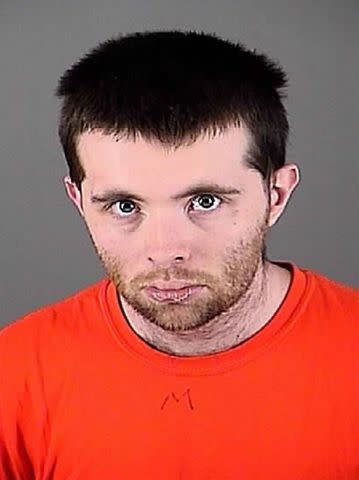
“It’s not like I didn’t think of every other option besides murder. I even ran away from home, and within four hours she found me and brought me back, putting in place paperwork saying I was incompetent, and she had power of attorney over me,” says Gypsy. “I was trying really hard to figure out another way.” In the end she chose murder: “One night Nick said, ‘I will do anything to protect you,’ ” she recalls. “And I said, ‘Anything?’ He said, ‘Yes.’ ”
Gypsy stops short of detailing her mother’s death at the hands of Godejohn. He and Gypsy were captured at his home in Big Bend, Wis., one day after police discovered Dee Dee had been stabbed. Godejohn is in a Missouri prison, where he’ll remain for the rest of his life after being convicted of first-degree murder. While in past interviews he’s stated, “I would do it again” to help Gypsy, his co-defendant shudders at the thought.
“I regret it every single day,” says Gypsy, who admits she “feels responsible for putting him in that situation. However, the act to commit murder was on him as well. Everyone has a choice.”
Never really her own, her life by then was even more bleak.
“While I was awaiting my sentence, I told my attorney, ‘If I get a life sentence, I am committing suicide. I can’t live forever in a prison cell.’”
Being given a lighter sentence that took into account the abuse she suffered gave her hope. In the years that followed, “I got my GED. It took me five years, but considering the fact that I had never really been to school, I’m really proud of myself.” She’s also picked up much-needed life skills.
“What my mom taught me was not much,” says Gypsy. “I didn’t know how to use a tampon, and another inmate who’s like a mother figure taught me how to use one. I’m now in prison around women who’ve been around the block, so I’ve been able to gain some positives from the experience.”
One of Gypsy’s best prison memories is saying “I do” to husband Ryan Anderson in 2022. The two first “met” when he blindly mailed her a letter in 2020. “I told her what her story meant to me,” says the 37-year-old Louisiana special education teacher, who’d watched Mommy Dead and Dearest.
He was shocked when he got a response from Gypsy. “I had butterflies when we emailed, but what sent it over the top was the first time I heard her voice.”
Having connected during the pandemic, “Ryan has seen me through,” says Gypsy. “He’s so patient with me. I can be an emotional handful. He knows how to calm me down.”
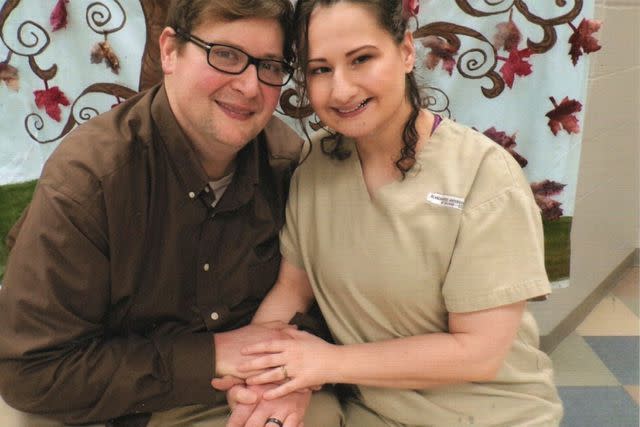
Courtesy Gypsy Rose and Ryan Anderson
Ryan Anderson, Gypsy Rose BlanchardGypsy’s dad and stepmom, who forged a strong bond with her over the past eight years while providing for her needs in prison, were initially against the union. “She can be spontaneous and jump into things without thinking,” says Rod, who fears she may have trouble navigating marriage. But, adds his wife, Kristy, “I told her if it doesn’t work out, I’ll be there to pick up the pieces. I really hope it does—Ryan’s a great guy.”
Gypsy hopes to start a family with her husband but has fears about the “really hard conversation” she’ll need to have with her kids about their grandmother. As Anderson and her family excitedly make plans for their lives together, Gypsy is still processing it all. “I still love my mom,” she says of Dee Dee.

For more on Gypsy Rose Blanchard's case, subscribe now to PEOPLE, or pick up this week's issue, on newsstands now.
According to Gypsy, Dee Dee was once diagnosed with bipolar disorder and schizophrenia. As for Munchausen syndrome by proxy, “I wish I was more educated on it,” she says. “I’m still really trying to come to a place of forgiveness for her, for myself and the situation.”
What she does know unequivocally: “I regret killing my mom. She didn’t deserve that,” she says. “She was a sick woman. The choice I made to commit murder was never the right choice. So my mission now is to take what I’ve done and what she did and bring as much awareness as I can.”
Want to keep up with the latest crime coverage? Sign up for PEOPLE's free True Crime newsletter for breaking crime news, ongoing trial coverage and details of intriguing unsolved cases.
Bracing for the spotlight and scrutiny her release will bring, Gypsy insists that, much like her presumed namesake, attention was never her goal. “Some people are like, ‘She just wants to be famous,’ and that’s not the case,” says Gypsy, who’s set to put out an e-book, Released.
“But I’ve been blessed with a platform to create change. Soon I’ll be home with my family and my husband’s arms around me. I’m on the eve of being happy.”
The Prison Confessions of Gypsy Rose Blanchard, a six-hour special offering unprecedented access to the most popular victim of Munchausen by Proxy, premiered Jan. 5 on Lifetime at 8 p.m. ET/PT, with the rest of the episodes airing through Jan. 7. Episodes will be available to stream on various services and on the Lifetime app the day after they air.
If you suspect child abuse, call the Childhelp National Child Abuse Hotline at 1-800-4-A-Child or 1-800-422-4453, or go to www.childhelp.org. All calls are toll-free and confidential. The hotline is available 24/7 in more than 170 languages.
If you or someone you know has been a victim of sexual abuse, text "STRENGTH" to the Crisis Text Line at 741-741 to be connected to a certified crisis counselor.
For more People news, make sure to sign up for our newsletter!
Read the original article on People.

